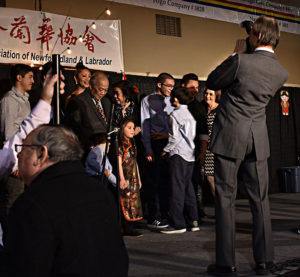Chinese New Year is known as the Spring Festival in China. The original name does not seem apt during a St. John’s winter. Despite the weather, however, the local Chinese community joyfully welcomed the new year.
By Melissa Wong
Kicker
At a dinner gala decorated with red paper lanterns, around 375 people recently celebrated the informal but important holiday Chinese New Year in St. John’s.
“We are supposed to come home, come home no matter where you are,” said Shuangcheng He, the president of the Chinese Students’ Association. “Unfortunately, I am on the other side of the earth, so I cannot go back.”
Shuangcheng He sat at an empty table while the Church Lads’ Brigade Armoury was being cleaned up for the dance hosted by the Chinese Association of Newfoundland and Labrador after the dinner gala has ended.

The Chinese community in St. John’s had to overcome many obstacles to hold on to its culture and festivals. Despite many challenges, the Feb. 17 event was a special celebration.
The community celebrated the Year of the Dog and the fact that Dr. Kim Hong, the founder of the Chinese Association of Newfoundland and Labrador, was awarded with a Senate of Canada 150th Anniversary Medal by Senator David Wells. Thus, this was the biggest Chinese New Year celebration ever held in St. John’s.
“Chinese New Year is the Biggest Mammal Migration”
“People travel a lot (during the festival),” said Shuangcheng He.”There is a joke about it. I don’t know if you are aware some national geography program said the African Deer Horse, or something, migrates. They said it was the biggest mammal migration. No, Chinese New Year is the biggest mammal migration.”
In China, the people have holidays much the same as people in North America. China allows time off work to return home to celebrate the new year. Although many countries around the world celebrate Chinese New Year, it is not a formal holiday in many of those countries.
“Everybody . . . goes home and goes back to their hometown to spend the holiday with their family,” said 66-year-old Paulo Lei who has lived in Macau, China, for 60 years. Six years ago, he left job as an engineer in China. Now he owns a restaurant called The Peaceful Loft with his wife in downtown St. John’s.
“I just bought a house nearby, so I have a mortgage from the bank,” Lei explained after he had finished showing a customer the plastic, red firecracker decorations he had put up for the lunar new year. “I need to work hard. If I stop my business (and go home to celebrate) how can I pay my mortgage?”
The Spring Festival
In China, Chinese New Year is called the Spring Festival. However, due to globalization, many countries outside China now call it Chinese New Year, which is used to celebrate the coming year itself according to the lunar calendar.
Sunyun Su, a graduate of Memorial University, pointed at the snow outside and said she chose not to call it the Spring Festival because the St. John’s weather does not reflect a celebration about the return of spring.
“Even if we are so far away from the homeland, I try to celebrate,” said Iris Yang, the current president of the Chinese Association, as the patrons danced to Chinese and North American music. “Chinese New Year is the biggest event for all Chinese people around the world just like Christmas for Canadians.”




Be the first to comment